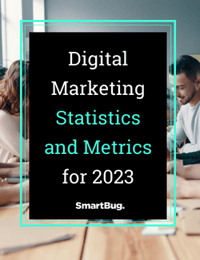
From Insight to Impact: Artificial Intelligence in Marketing for Maximum ROI
September 5, 2023
By John Suarez
Maximizing ROI using artificial intelligence in marketing can be a simple matter of crunching numbers, saving time, and seeing dollar signs grow.
But to focus solely on that would do everyone involved, from the creative to the client, a massive disservice. It might ultimately hurt profit potential, too.
Wondering what we mean? We’ll get there in a second. Before we talk marketing, let’s chat about cars.
What Is Your Artificial Intelligence Marketing Machine Capable Of?
Imagine you've just stepped into a sleek, state-of-the-art autonomous car. The dashboard lights up. The engine purrs. The GPS politely asks where you'd like to go. It's all very impressive.
But here's the catch: While the car can drive itself, you still need to tell it the destination. And if you're heading somewhere tricky—like up a narrow, winding mountain road or into a bustling city center during rush hour—you’re going to want to take control.
Much like an autonomous car, an AI-enhanced marketing machine can oversee the automation of many tasks, from data analysis to content creation. It can speed up processes, avoid traffic jams of data overload, and even predict the best routes to your target audience. And it can enable us to think less about our campaigns' individual nuts and bolts—the hashtags, the email subject lines, the blog outlines—and more about the big picture.
But, as with our analogous autonomous car, even the smartest AI-powered marketing machine needs human direction to get anywhere.
Acknowledging the Capabilities and Limitations of AI in Marketing
While it’s both true and exciting that AI tools can tackle an increasing range of marketing tasks, this doesn’t mean that AI should always handle these initiatives.
In fact, delegating nuanced tasks to AI often highlights precisely why human creativity needs to be in charge. For example:
- Where AI might be able to analyze data, a human marketer needs to understand the story that data is telling.
- Where AI might be able to suggest marketing strategies, a human marketer must evaluate and refine those strategies or decide to opt for more innovative approaches.
- Where AI might struggle to adapt to sudden market changes or jump on viral moments, a human marketer can pivot as needed to seize opportunity.
Of course, this doesn’t mean AI shouldn’t be a part of your marketing machine.
Think of AI as Your Brilliant (Yet Somewhat Naive) Marketing Assistant
If you’re in marketing, we’d bet you got into this field because you love the art and science of it: the call to be creative and data-driven at the same time.
The real mindset shift we as marketers must embrace isn't just about AI-fueled efficiency. This is an opportunity to elevate our work patterns, thought processes, and creativity tenfold. This evolution can move us from managing repetitive tasks to being able to focus on creative ideation, deeper human connections, and strategic insights. Each of us now has access to an AI intern that can help us streamline our workload, freeing us up to dive deep into strategy.
Consider AI your way to align yourself more closely with data and best practices but also have the bandwidth you need to experiment, explore, and have more fun with your projects.
That just leaves the question: What, specifically, are the best ways to use AI in marketing, if we want to save time and resources but also end up with stronger, more valuable deliverables?
Tactical Use Cases for Artificial Intelligence in Marketing
With appropriate human review and oversight, here’s how I’m excited to use AI to streamline marketing operations and, simultaneously, provide more value.
1. Use artificial intelligence in marketing to conduct continuous, iterative research.
In the always-evolving marketing landscape, staying updated and prioritizing original research isn’t a luxury; it's a necessity if you want to be relevant and well positioned.
Often, we perform comprehensive research during onboarding or discovery on a new project and then consider the job finished. AI research tools can help you stay on top of ongoing research and data consumption so you never miss a beat.
Your artificial intelligence action item: Use generative AI or AI-enabled tools to help with keyword research, trending topics, competitor research, and more—and then schedule recurring reminders to dive back into the research over the life of your project, not just at the beginning.
2. Use artificial intelligence in marketing to gain deep audience understanding.
It’s easy to compile high-level personas with basic demographics and call it a day. Successful, goal-oriented marketing strategies demand something more. We have the data necessary to understand our audiences on a wildly personal level (at scale, and in a timely manner). Using AI, we can analyze sentiment, discover behavioral patterns, effectively determine pain points, and make educated guesses about what excites our dream customers.
Your artificial intelligence action item: Use tools such as Semantria or Claude 2 (for sentiment analysis) and Poll the People (for consumer research) to understand more about what your audience wants and how your brand is perceived. You can also tell your favorite generative AI platform about your personas, and ask what pain points or content interests it recommends focusing on.
3. Use artificial intelligence in marketing to optimize your website.
A surprising number of businesses overlook their website’s potential. They don’t optimize it for their specific audience’s needs or keep it updated as their market changes.
You can use AI to understand who your website needs to talk to, uncover helpful data about what your audience needs to hear to convert, and identify ways to make sure your site is truly competitive.
Your artificial intelligence action item: Use generative AI or AI content assistant tools to recommend strategic, tailored, and updated content for your website geared to attract and delight your target audience and customer base.
Want extra credit? You can use AI tools such as Optimizely or HubSpot Smart Content to adjust your website to provide a personalized user experience, or even launch a chatbot to engage visitors and guide them through your sales funnel.
4. Use artificial intelligence in marketing to enhance your content strategy and creation.
Content is king—but only if that content is relevant, helpful, and targeted.
AI can help you take the guesswork out of determining relevance and understanding the audience you’re working to target. More than that, AI can streamline the process of creating outlines, proposing timely social post topics, and more so you can concentrate on the fun stuff (ensuring that your content is better than anyone else’s).
Your artificial intelligence action item: Use tools such as BuzzSumo to identify trending topics in your niche, or play with Jasper’s ability to generate optimized outlines to keep you on track.
5. Use artificial intelligence in marketing to make it easier to start creating!
Regardless of the type of marketing you do, whether you focus more on strategy or you’re the one writing social posts and sales decks, you’ve likely been confronted with Blank Page Syndrome. (Everyone has.)
AI can help us move past wondering how to get started on something new (which is difficult) and move into making something that already exists align with our vision (which is far easier).
Your artificial intelligence action item: Chat with your generative AI of choice to get the ball rolling! Tell ChatGPT a little about your project and ask for an intro paragraph, or get Bard to find a relevant source for you to read and get your own gears turning.
How Are You Harnessing the Power of Artificial Intelligence in Marketing?
If you’re looking for ways to streamline your daily operations through artificial intelligence in marketing, the world is your oyster. New tools are popping up every week to help you save time on your routine tasks—and, more importantly, to help you dive deeper into more satisfying, creative, and strategic work.
Interested in learning more about what you and your team can achieve with a great marketing strategy? Check out these everyday digital marketing statistics for 2023 to get excited about goals you (and your AI marketing assistant) can work toward.

Knowing the right metrics and goals to hit when launching marketing campaigns can be challenging. With this report, you'll find common inbound marketing, the metrics used to measure success, and digital marketing statistics for a reference point for your performance goals.
The Everyday Digital Marketing Statistics and Metrics for 2023


About the author
John Suarez is the Director of HubSpot Strategy, overseeing a team of expert HubSpot Technologists who build and deploy HubSpot architectures & processes for our clients. This means tailoring HubSpot platforms to a client's full customer lifecycle, including: marketing processes, sales processes, customer success, and marketing and sales operations. Read more articles by John Suarez.







